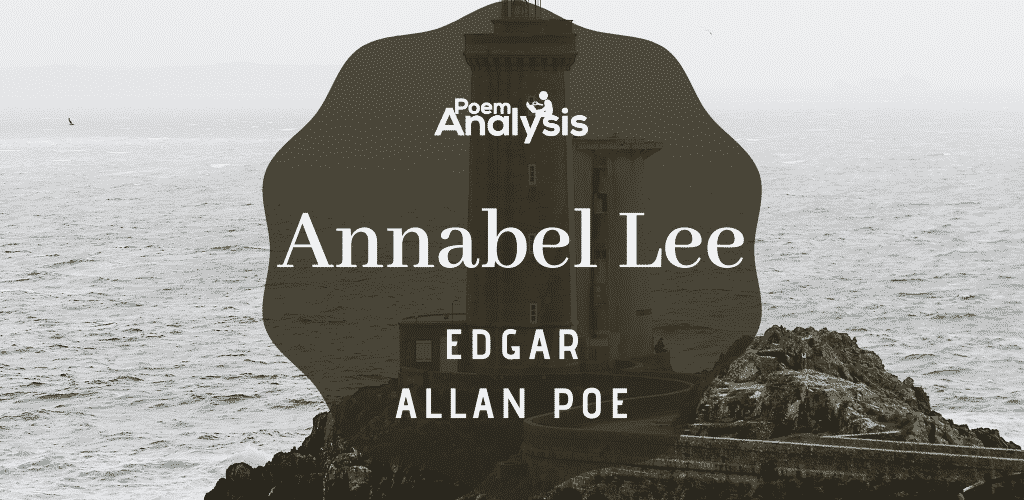Edgar Allan Poe wrote Annabel Lee in a unique tone, as it was one of the trademarks. When the poem begins, it sounds like a fairy tale and gives the reader a feeling of all that is good and happy. But underneath this joyful tone is a tone that is more ominous, and Poe uses certain words and phrases that give this eerie feeling. Partway through the poem, the readers begin to understand that this is not a common fairy tale. Rather, this is a dark and terrifying story. The tones and rhythms Poe uses create an almost hypnotic effect.
The poem reads like a nursery rhyme in the way that it sounds, allowing the readers to venture back into childhood days to relate with the speaker. However, the poem’s content is not suitable for children, so the contrast between the rhyme and rhythm of the poem and the content leaves the reader feeling deeply moved. This is a skill Poe used in many of his works. His tone is entirely unique. He has a way of grasping the readers’ attention and pulling them into his work before he reveals the truly dark and sometimes cynical nature of the content.
Before reading this poem, it's helpful to know that Poe experienced a great deal of loss throughout his life. Perhaps most notably, the death of his young wife, Virginia. Poems such as this are commonly thought to be inspired by the various deaths of loved ones that Poe endured.
Annabel Lee Edgar Allan PoeIt was many and many a year ago, In a kingdom by the sea,That a maiden there lived whom you may know By the name of Annabel Lee;And this maiden she lived with no other thought Than to love and be loved by me.I was a child and she was a child, In this kingdom by the sea:But we loved with a love that was more than love— I and my Annabel Lee;With a love that the winged seraphs of heaven Coveted her and me.And this was the reason that, long ago, In this kingdom by the sea,A wind blew out of a cloud, chilling My beautiful Annabel Lee;So that her highborn kinsman came And bore her away from me,To shut her up in a sepulchre In this kingdom by the sea.The angels, not half so happy in heaven, Went envying her and me—Yes!—that was the reason (as all men know, In this kingdom by the sea)That the wind came out of the cloud by night, Chilling and killing my Annabel Lee.But our love it was stronger by far than the love Of those who were older than we— Of many far wiser than we—And neither the angels in heaven above, Nor the demons down under the sea,Can ever dissever my soul from the soul Of the beautiful Annabel Lee:For the moon never beams, without bringing me dreams Of the beautiful Annabel Lee;And the stars never rise, but I feel the bright eyes Of the beautiful Annabel Lee;And so, all the night-tide, I lie down by the sideOf my darling—my darling—my life and my bride, In her sepulchre there by the sea, In her tomb by the sounding sea.
Summary
‘Annabel Lee’ by Edgar Allan Poe is a beautiful ballad-like poem that describes one speaker’s loss of his lover, Annabel Lee.
The poem tells the story of two lovers in a kingdom by the sea. They were so deeply in love that the angels in heaven envied their love. A wind came down from the clouds, “chilling and killing” Annabel Lee. Despite passing away, the speaker insists that their souls are still entwined. Their love is so powerful that no one, not even angels, is able to take it from them.
The Poem Analysis Take

Expert Insights by Emma Baldwin
B.A. English (Minor: Creative Writing), B.F.A. Fine Art, B.A. Art Histories
This is a tragic narrative poem that tells the story of the speaker's undying love for Annabel Lee. It is set in a "kingdom by the sea" and features angels that come down from heaven, giving the poem a magical quality. The poet's use of language in this piece creates a haunting tone that has made the poem a classic piece of literature.
Structure and Form
‘Annabel Lee’ is a six-stanza poem that uses a few different rhyme schemes. For example, the first stanza rhymes in a pattern of ABABCB. The poem also uses a combination of anapests (two unstressed syllables followed by one stressed syllable) and iambs (one unstressed syllable followed by a stressed syllable).
Literary Devices
The poet uses a few different literary devices in this poem. These include:
- Assonance: This is seen in the repetition of vowel sounds. For example, “But we loved with a love that was more than love.”
- Imagery: The poet uses especially memorable images in this piece. For example, “In this kingdom by the Sea / A wind blew out of a cloud, chilling / My beautiful Annabel Lee.”
- Symbolism: The kingdom by the sea can be seen as a symbol of the lovers’ brief happiness, while the angels are symbols of envy.
Detailed Analysis
Stanza One
Lines 1-2
It was many and many a year ago
In a kingdom by the sea
These first two lines set the poem up as a fairy tale. The reader can immediately begin to imagine a time long ago, in a kingdom far away, somewhere on the coast of a distant sea. The fairy tale tone of this poem serves to give the readers an understanding of the speaker’s experiences within the poem and the effect the occurrences in the poem had on him.
Lines 3-4
That a maiden there lived whom you may know
by the name of Annabel Lee
These two lines continue the literary tone of a fairy tale. So far, this fairy tale is proceeding just like many others. We have a time long ago, a kingdom far away, and, of course, a maiden. This maiden quickly becomes the central figure in the poem. She is immediately given a name, and her name and her description as a “maiden” quickly give readers a picture of a young and beautiful girl.
Lines 5-6
And this maiden she lived with no other thought
than to love and be loved by me
These lines reveal the youth of both the speaker and the maiden. They have no other thoughts or concerns besides love and love alone. The reader quickly realizes that both the speaker and Annabel Lee are young and in love. This sets up the speaker and Annabel Lee as very relatable characters, as the majority of readers will be able to connect with a memory of young love.
Stanza Two
Lines 7-8
I was a child and she was a child
In this Kingdom by the Sea
These lines serve a few different purposes. First of all, the speaker lets the readers know that they were, in fact, children. He doesn’t use the word “youth” or even “young” so as to let the reader think that they were perhaps in their early teenage years. He specifies that both of them were children.
In line 8, he repeats that they lived in the Kingdom by the Sea. This repetition not only reminds the readers of the setting of the poem but also has a rather rhythmic effect that helps the poem continue to read as a fairy tale with an almost lullaby quality to it. Some have called Poe’s poems “hypnotic,” and perhaps this rhythmic repetition is the reason for this hypnotic effect on readers.
Lines 9-10
But we loved with a love that was more than love
I and my Annabel Lee
With these lines, the speaker intends to ensure the readers that just because they were children does not mean that their love was not very real. The speaker certainly felt this love at the deepest level and is certain that Annabel Lee feels it no less. The repetition of her name also serves to further acquaint the reader with the subject of the poem so that the reader can relate to the speaker in sentiments toward Annabel Lee.
Lines 11-12
With a love that winged seraphs of heaven
coveted her and me
These lines further emphasize the love the two children had for each other. It was a love that was not of this world, for even the angels looked down and felt a jealous pang because of the love that the two children shared. It was a love that angels, the speaker supposes, could not feel, and so they coveted the feeling the speaker and Annabel Lee had for each other.
This gives an interesting perspective on angels, as in most literature, they are portrayed as holy beings who look out for and guard human beings. Here, they are portrayed as jealous beings who look at the children and long for that which they cannot have- human love.
Stanza Three
Lines 13-16
And this was the reason that, long ago
In this kingdom by the Sea
A wind blew out of a cloud, chilling
My beautiful Annabel Lee
In these lines, there is an abrupt shift. This is no longer a common fairy tale. Suddenly, Annabel Lee catches a cold from a “wind that blew out of a cloud.” The speaker attributes the reason for this cold to the covetousness of the angels. He explains that their feelings of jealousy were in fact “the reason that…a wind blew out of a cloud, chilling my beautiful Annabel Lee”.
In line 16, the speaker refers to Annabel Lee as “my Annabel Lee.” This possessive tone allows the readers an even deeper insight into the feelings the speaker has for her. He felt that the two of them loved one another as much as any two people could love, and he felt that he could call her his own. Line 15 simply says that Annabel Lee has been chilled. The readers do not know if she has simply caught a cold or if her body is cold and dead-chilled.
Lines 17-18
So that her highborn kinsman came
and took her away from me
These two lines leave the reader wondering further. In the previous lines, the readers were left to wonder whether “chilled” meant death or simply chilly and a bit sick. Now, the readers see a “highborn kinsman” who came and took Annabel away from the speaker.
At this point, the reader either believes that this kinsman was one who had died before her and came to take her soul to heaven or that this kinsman was a living relative who came to take Annabel Lee away in her sickness. Either way, the speaker is left without his beloved.
Lines 19-20
To shut her up in a sepulchre
In this kingdom by the sea
With these two lines, the reader is left to further wonder whether Annabel has died, or whether she was simply shut up in a mansion with her rich kinsman. A sepulcher in this context could either mean a large, beautiful tomb or it could mean a large beautiful home that the speaker views as a tomb because the one he loves has been confined there where he can no longer see her.
Stanza Four
Lines 21-22
The angels, not so happy in heaven,
Went envying her and me
With these lines, the speaker reminds the reader that the reason he has lost his young lover is because of the angels. He makes them seem vindictive, as he reveals that they are still envious of him.
Lines 23-26
Yes! That was the reason (as all men know)
In this kingdom by the sea,
That the wind came out of the cloud by night,
Chilling and killing my Annabel Lee
These lines confirm the death of Annabel Lee, although they do not reveal whether the first chill had killed her or whether the angels, still envious, sent another chill to end her life. The speaker continues the tone of the fairy tale by reminding the readers that this has all happened to him while he was “in this kingdom by the sea.”
There is an ironic contrast between the fairy-tale tone and the content of these lines. This is certainly no fairy-tale ending, and thus, the tone causes the reader to feel this pang of loss and death all the more.
Stanza Five
Lines 27-30
But our love it was stronger by far than the love
of those who were older than we
Of many far wiser than we
The speaker reiterates the strength of their love for one another and even asserts that their love is stronger than the love of the adults that he knew. These lines serve to assure the reader that this love is not a silly, childish love that will be easily forgotten at the death of Annabel Lee. It leaves the readers with the understanding that this strong love will not be forgotten with her death.
Lines 31-34
And neither the angels in heaven above,
Nor the demons down under the sea,
Can ever dissever my soul from the soul
Of the beautiful Annabel Lee
These lines reveal that the speaker would not stop loving Annabel Lee, even though death took her away from him. He claimed that his soul would go on loving her soul so that even the angels of death could not succeed in separating them from one another. While they may have taken her body away from him physically, he asserts that they could never tear their souls apart from one another.
Stanza Six
Lines 35-37
For the moon never beams without bringing me
dreams
Of the beautiful Annabel Lee
With these lines, the speaker reveals exactly how his soul is still tied to the soul of Annabel Lee. He claimed that the angels could not separate their souls, and with these lines, he reveals one way in which he is still bonded to his young love. He claims that he dreams of her every night. If the moon is sure to beam at night, then he is sure to dream of Annabel Lee. And so he meets her there in his dreams, and his soul continues to love her soul.
Lines 38-39
And the stars never rise but I feel the bright eyes
Of the beautiful Annabel Lee
These lines reveal yet another way in which the speaker has not really been separated from the one he loves. Although he can no longer be with her physically, he still feels her bright eyes every time he sees the stars.
Lines 40-41
And so, all the night-tide I lie down by the side
Of my darling, my darling, my life and my bride
These lines reveal the shocking fact that the speaker viewed Annabel Lee as his own bride, child though she was. Whether she was actually his bride is left for the readers to conjecture. Either way, it strengthens the reader’s understanding of the speaker’s love.
He has already claimed that this love was strong enough to make the angels jealous. He has revealed that this love was stronger than those that were older and wiser than they, and now he has officially called her his bride, giving the sense not only of innocent childhood love but also of a life-long commitment.
Lines 42-43
In her sepulchre there by the sea—
In her tomb by the sounding sea.
In these final lines, the speaker is still lying down by the tomb of the one that he loved. This fairy tale took a dark turn when the angels sent a chilly wind to take Annabel Lee, and now it ends not with happily ever after but with a broken-hearted man who sleeps by the grave of his lover every night. While this is a tale of undying love, it is certainly not a typical fairy tale.
Edgar Allan Poe’s Background
Edgar Allan Poe is one of the most renowned writers. His short stories and poetry have infiltrated the canon of literature since he first began writing. At the age of only thirteen, he had written enough short stories to publish a book. He did not publish until later on in life, however. He only lived to be forty years old, but in his short lifetime, he wrote some of the most famous literature.
Before becoming a famous and known writer, Poe experienced a lifetime of misfortune. It began when his parents died. He was left an orphan. The man who took him in sent him to boarding school and left nothing to him when he died.
There is substantial evidence to suggest that this poem was written for Poe’s wife, Virginia Eliza Clemm Poe. The two were first cousins, although Poe did not meet her until he was nearly an adult. Poe, parentless and faced poverty at a young age, sought out the relations of his late father and was taken in by his Aunt Maria Clemm.
Soon after, his cousin Virginia became the object of his affection, and he took her to be his wife when she was yet thirteen. Although she was young, she claimed happiness in her marriage with Poe and even wrote poems about her love and devotion to her. Shortly after, Virginia contracted tuberculosis and ended up dying at the young age of twenty-four. It is easy to see that Poe felt love and affection for this woman, whom he eventually took as his bride, though she was only a child at the time.
This poem is one of Poe’s ways of asserting that though Virginia was a child when they met, their love for one another was deep and real. In Poe’s time period and within his society, it was not entirely uncommon for cousins to marry, or for girls to marry in their teenage years.
Poe’s love for Virginia was certainly strong, and when she died, he suffered greatly. In fact, he only lived two years longer than his late wife, and many still hold that he died of a broken heart. During the years after the death of Virginia, Poe struggled with severe depression and alcoholism. Some medical practitioners of his time, upon finding him in a semi-conscious state four days prior to his death, have conjectured that he was suffering from rabies. The reason for his death is not confirmed (Poetry Foundation).
Works Cited:
- “Edgar Allan Poe.” Poetry Foundation. Poetry Foundation, 2015. Web. 24 Mar. 2016.





LOL I am very thankful to Alisa for putting this on we had to do this in class but your blog really helped me thanks
That’s really lovely. Glad that the article helped.
we study this poem now
Cool – What are your thoughts on it?
Her real name was Annabelle Lea Rose and she lived in Charleston SC which was know at the time the Kingdom by the sea. I found her grave.
Great additional information. If I ever figure out how to upvote, I will do one of those!
noob
This is an anagram of U2’s Frontman.
Hahaha
Noob – a person who is inexperienced in a particular sphere or activity, especially computing or the use of the internet.
I know. I was raised in the 90’s I’m good with 1337 speak 😉